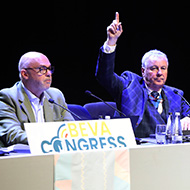Poultry specialist wins 2024 Plowright Prize
Prof Tomley is internationally renowned for her studies into the Eimeria pathogen.
Fiona Tomley, a microbiologist and poultry health specialist, has been awarded this year’s Plowright Prize, in recognition of her work reducing infectious diseases.
Prof Tomley’s career, spanning four decades, has seen her work contribute to research across the field. This has included basic scientific discovery, technological advances, industrial collaboration, international research leadership and knowledge exchange.
Her research has also supported the understanding and control of viral and parasitic pathogens in poultry, and she has become internationally renowned for her studies into the Eimeria species which causes coccidiosis in chickens.
Prof Tomley currently works as director of the Global Challenges Research Fund (GCRF) One Health Poultry Hub, where she leads research projects on a global scale. Through this she has encouraged cross-sector collaboration, to consider how to achieve sustainable intensification of chicken meat and egg production without threatening human and animal health.
She is also a professor of experimental parasitology at the Royal Veterinary College.
Prof Tomley said: “It is a huge honour to receive the Plowright Prize and I am delighted that my work, and that of my colleagues and collaborators, has been recognised by the judging panel.”
As part of the Plowright Prize, Dr Tomley has been awarded £100,000 prize money. She will use this to establish a global mentoring network for veterinary infectious disease researchers, with a focus on the One Health approach.
Prof Tomley added: ““Researchers at the beginning of their careers are under extreme amounts of pressure, particularly when they move into leadership roles. This is especially tough for women, those in resource-poor settings, or those without access to support.
“I hope to help the next generation of researchers by providing mentorship opportunities to those in the UK and in low-and-middle income countries where many pathogens that pose a threat to animal and public health are endemic.”
The Plowright Prize is awarded by RCVS Knowledge annually, in honour of the veterinary scientist Walter Plowright – whose work led to the complete eradication of rinderpest.
Katie Mantell, chief executive officer at RCVS Knowledge, said: “The judging panel, comprising representatives from leading organisations working in animal health and infectious diseases, were hugely impressed by the extent, global reach, and impact of Professor Tomley’s work.
“I am delighted that the Prize is being awarded to an individual so deserving of the accolade and with exciting plans for using the funds to support future generations of research leaders.”
Image © RCVS Knowledge



 The British Equine Veterinary Association (BEVA) is to allow its registered veterinary nurse (RVN) members the right to vote.
The British Equine Veterinary Association (BEVA) is to allow its registered veterinary nurse (RVN) members the right to vote.